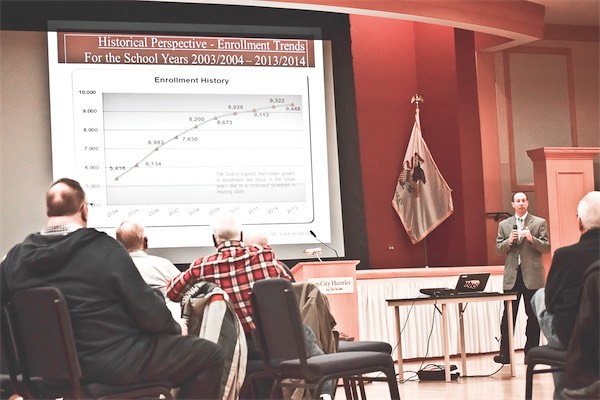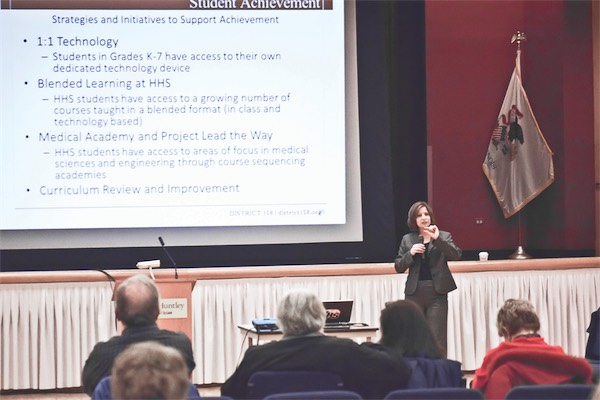The State of Illinois is not paying some of its bills on time, but School District 158 in Huntley is.
“We are losing state-aid money, and state reimbursements for some of our groups are late or not coming at all, but we are maintaining our financial integrity and are able to do things that benefit local taxpayers,” Mark Altmayer, chief financial officer for the district, recently told a Sun City audience.

D158 Superintendent John Burkey (standing, right) presents Members of the Current Affairs club with stats and figures on D-158’s enrollment and financial status at a recent meeting. (Photo provided)
Altmayer, District Superintendent Dr. John Burkey, and Ericka Schlicter, chief academic officer, spoke to about 75 community residents at a Current Events Club presentation Jan. 27 in Drendel Ballroom. The educators presented a rosy picture of district finances, touted some new technologies and innovations, and fielded a number of questions from the audience. Questions and conversations were generally positive, pleasant, and non-controversial, despite the property-tax issue that constantly occupies the minds of Sun City residents.
“One of the best ways to measure a school district’s financial viability is to look at the amount of its reserves, or its fund balance, as we call it,” Altmayer said. “Our reserves at the end of 2014 were $30 million, or about 34 percent of our current operating budget of $89 million. The Illinois State Board of Education says a local district should have at least 25 percent of its operating budget in reserves, so we are in pretty good shape.
“We also have been able to re-structure our debt and spread it into the future, and that is a major way we benefit local taxpayers such as yourselves here this morning,” he continued. “We’ve gone through a lot of change. Many of you have come to Sun City in the last 10 years. Thirteen years ago, we had 2,000 students and three buildings. Today, we have 9,400 students and nine buildings. We have navigated that change very well under Dr. Burkey’s leadership. At one point in time, we were one of the fastest-growing school districts in the state. Today, that growth continues, but at a slower rate.”

D158 Chief Academic Officer Erika Schlichter address program advancements and expansions. (Photo provided)
Altmayer said the district can be compared to a Fortune 100 company in many ways. “We don’t generate the revenue that such a company does, but we operate on a scale like one,” he said. “We have more than 1,600 employees, making us the second largest employer in McHenry County. We are a complex organization, with nine buildings on three campuses occupying thousands of acres. We own roads, parking lots, athletic fields, and lots of infrastructure. We own 105 school buses; we are the only school district in our area to own and operate our own bus transportation system. Almost all of our students come to and from school by bus.
“We spend about $8,500 to educate each of our 9,400 students in grades 1 through 12,” Altmayer went on. “That’s one of the lowest cost-per-student rates in our area.”
Dr. Burkey, who came to the district in 2006, has two children attending District 158 schools, in the 2nd and 6th grades. “We have our challenges, as all districts do,” he said, “but we are navigating them now better then the district was when I came. Over and over, I ask parents why they move to Huntley, and many times they tell me it’s because they want to be in our school district. I hear the same thing from Realtors.
“I remember in my first year, coming to this same place to talk to your group, and the newspapers were full of headlines about how this thing was wrong, and that thing was bad. I believe that, working together with the community, we have turned things around so we now talk about what great things we are doing for our future.”
We are on the cutting edge of technology, all of our classrooms in grades 1-7 are wireless, and we offer studies in biomedical sciences that are almost college-level. About 1,000 of our students are enrolled in at least one state-of-the-art blended class in which students study individually according to the way they learn. “Some students need a lot of structure like in a traditional classroom, some benefit from a little bit of independence, and some are so independent that they set their own pace of learning,”
Dan Armstrong, the district’s new director of communications, has developed videos of students and teachers describing this blended program, and it has been posted on YouTube on-line. He showed the audience two of these videos.
Schlicter also described the blended program, and said the district’s average ACT score has increased from 21 to more than 23 in the last few years. (This test is taken by all high school juniors in the nation and is one of the main qualifiers used by colleges and universities in their evaluation of student applications). “That’s a huge increase, and our students have responded well to our efforts to improve test scores.”
“Our educational philosophy is built around the concepts of teaching young people about collaborative and creative ways to solve problems, and critical thinking,” Schlicter said.
Altmayer and Burkey both asked Sun City residents to actively support their efforts to defeat Illinois Senate Bill 1 in the Illinois General Assembly. “This bill,” Burkey said, “is designed to change the ways money is distributed from the state to local districts. This sounds fine in principle, but it would take money away from financially viable districts, like ours, and give more to districts that are not so fortunate. It would take $2 million away from our district. We applaud the state’s effort to improve this situation, but the way they’re going about it is wrong. This bill was defeated in the last session of the assembly, and it was re-introduced at the start of the current session. We hope local taxpayers will communicate our concerns to their legislators.”
In response to audience questions about property taxes, Burkey asked the people to look at the big picture. “The reason we all have high property taxes is because of the way the state funds education,” he said. “I believe Illinois is the only state in the nation that uses property taxes to fund education at such a high rate. The state needs to fund education in a different way. We should be getting more money from state aid, and we are getting less.
“While the state tries to figure out how to deal with the enormous pension fund debt, we in District 158 are paying our local share of pension costs,” Dr. Burkey asserted. “There is a proposal being discussed to ask school districts to take on more of the burden of reducing the debt, but no one knows whether that approach or any approach will be adopted.”




